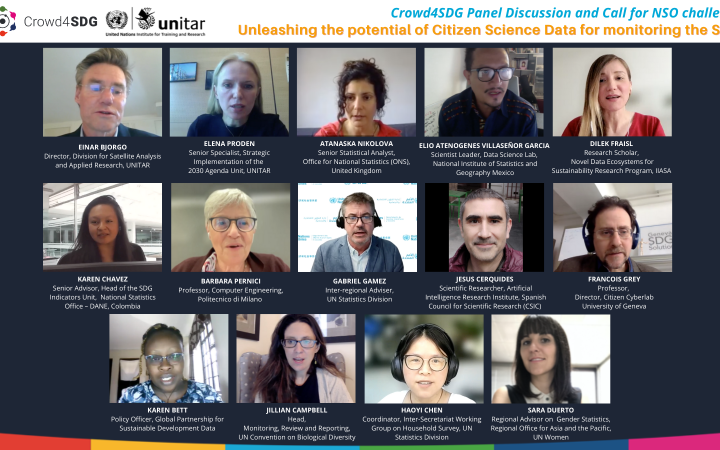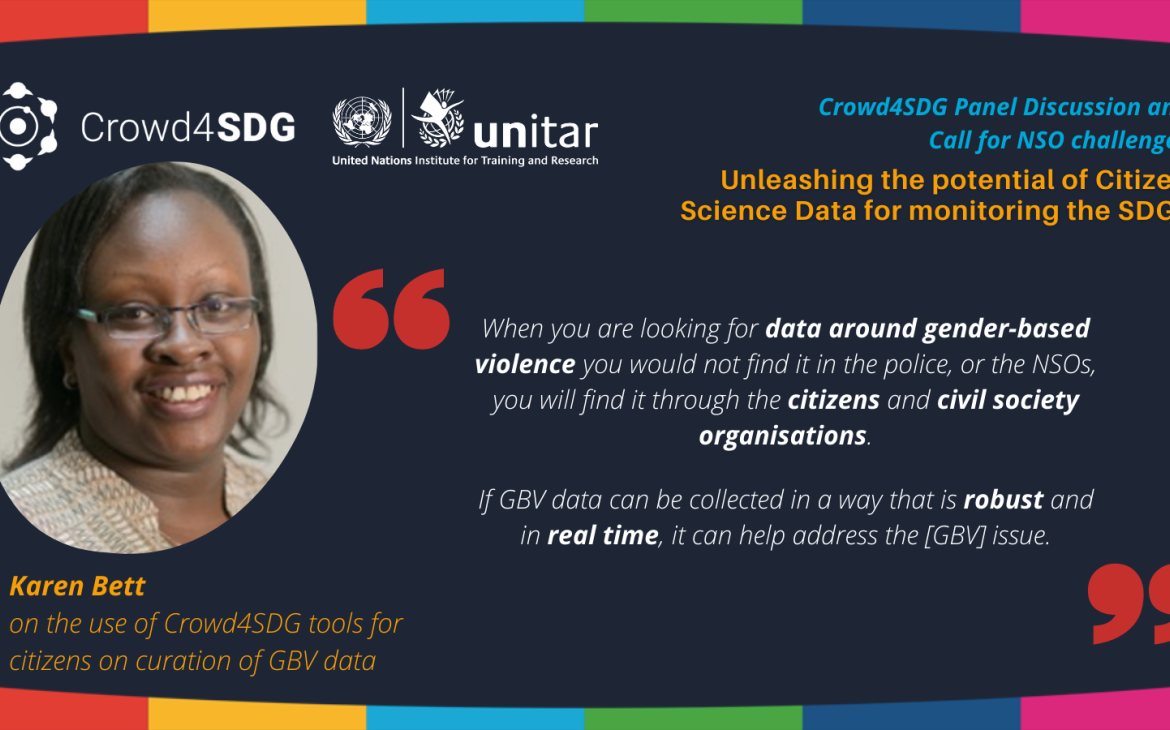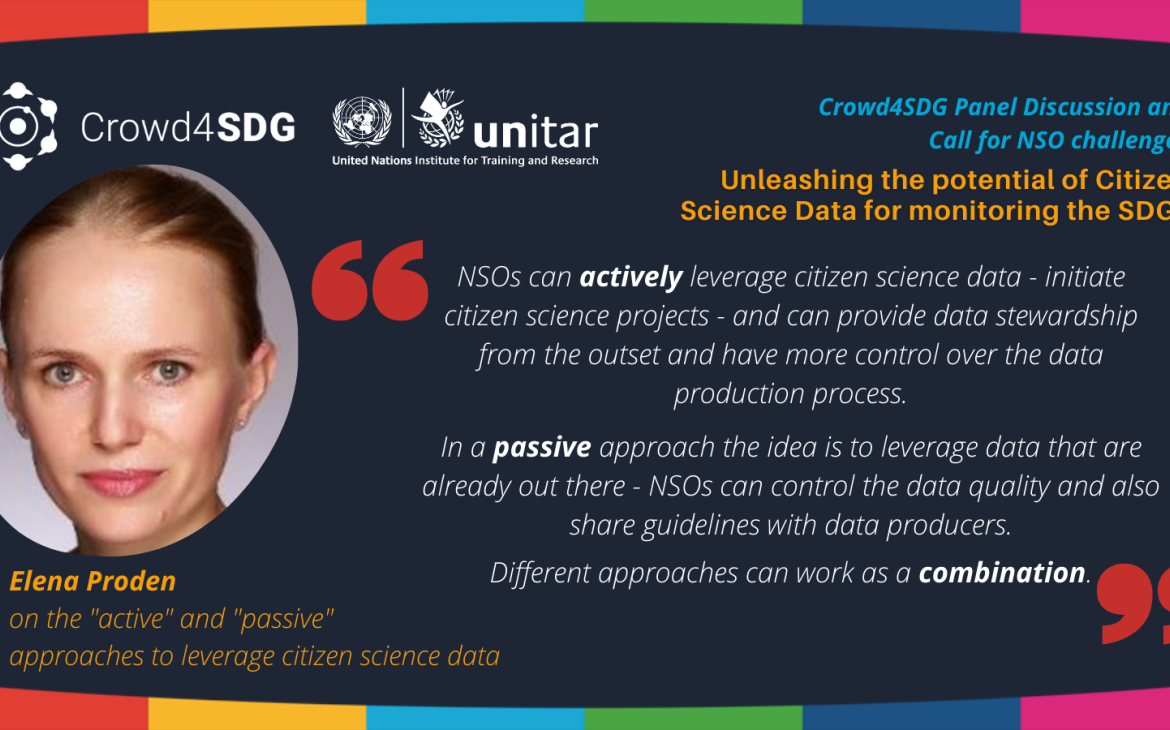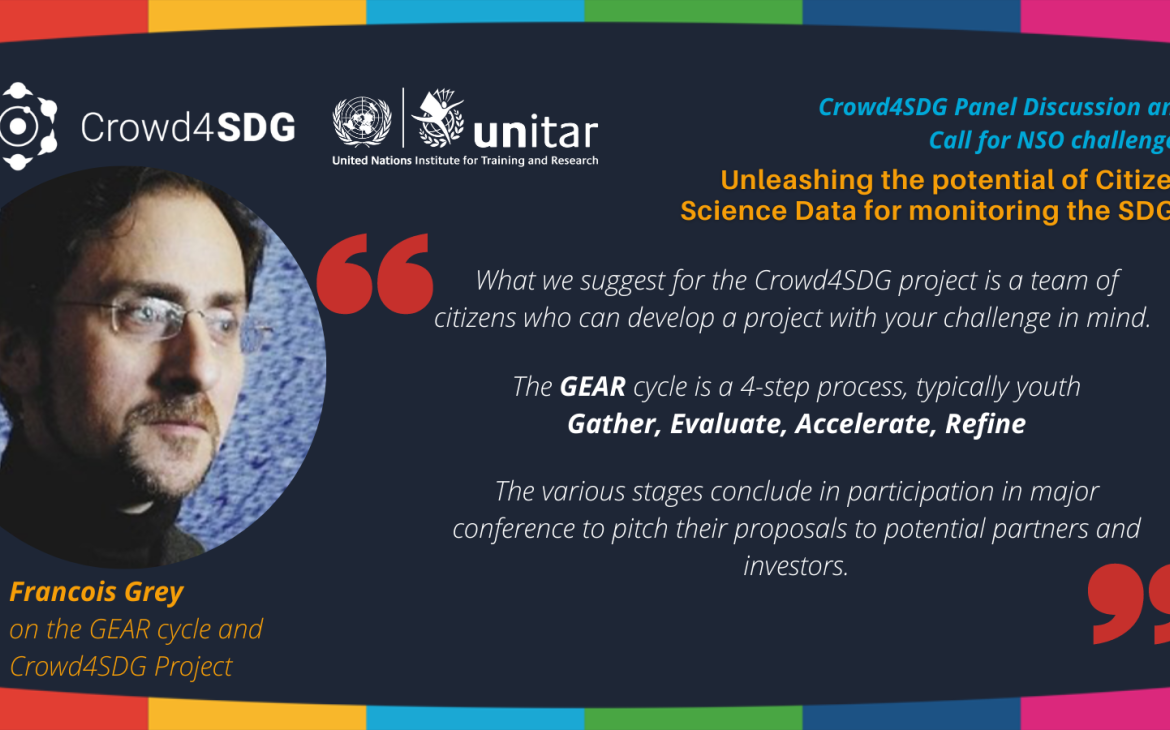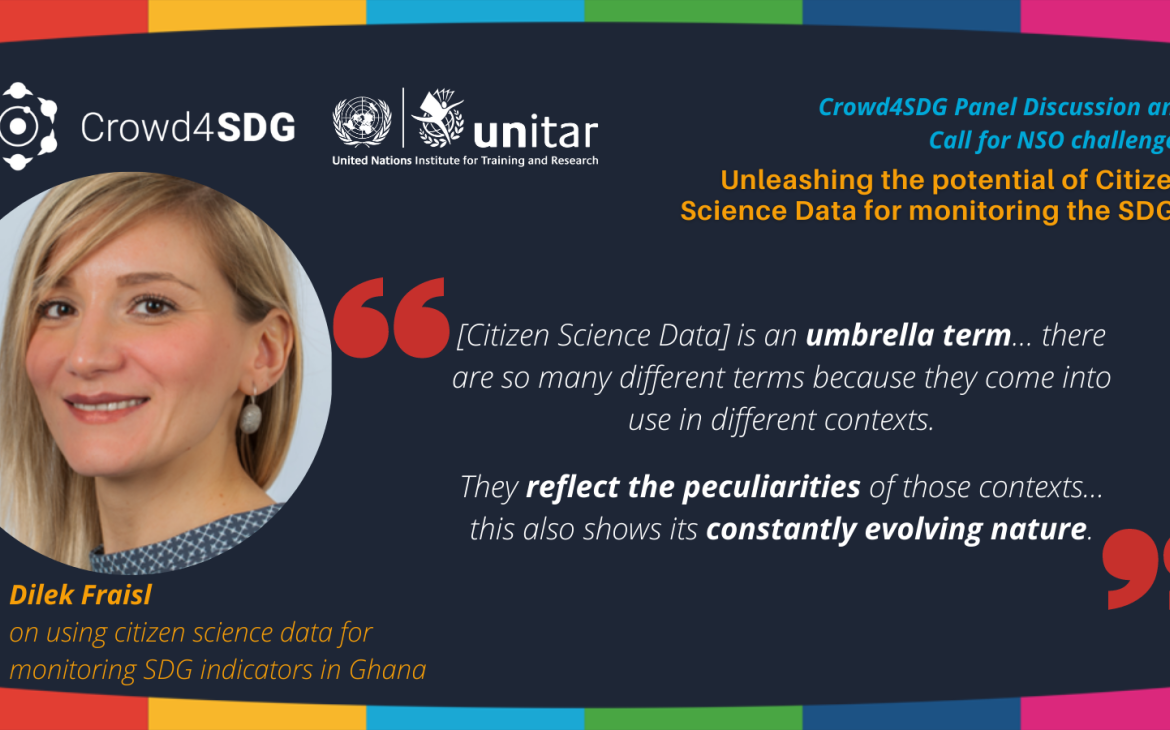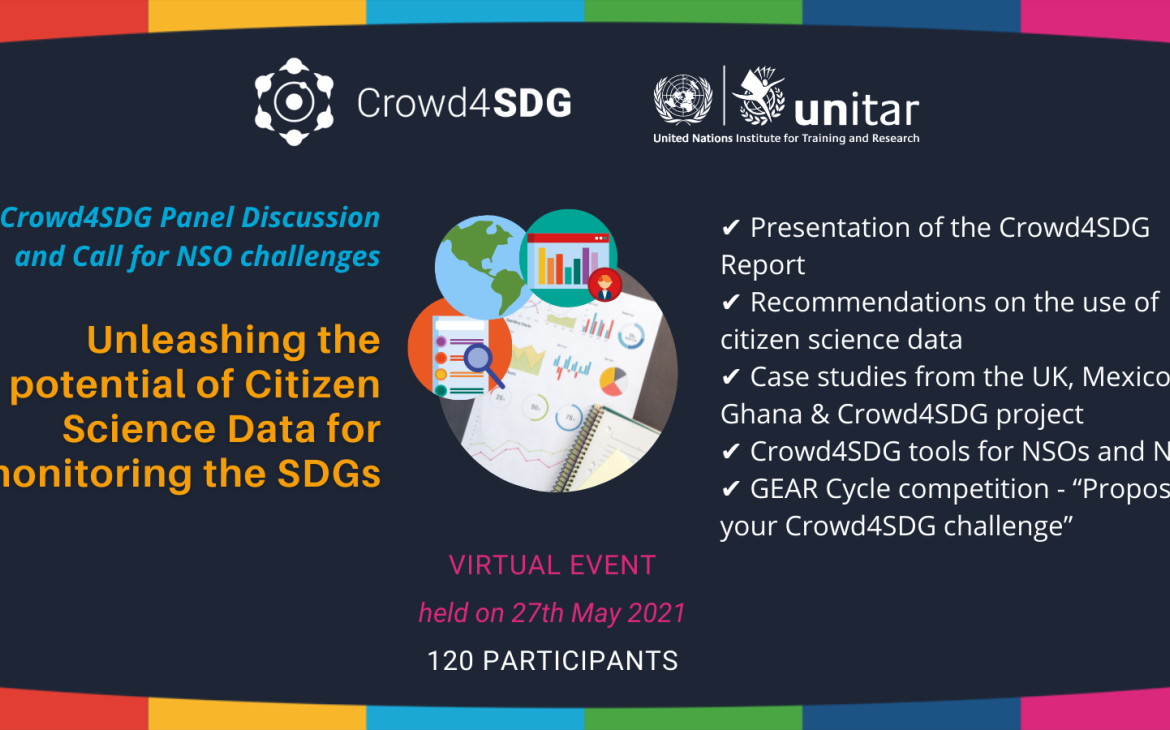On 27th May 2021, United Nations Institute for Training and Research (UNITAR), which is a partner in the EU-funded Crowd4SDG project, organised a panel discussion “Unleashing the potential of citizen science data for monitoring the Sustainable Development Goals (SDGs)” as part of the Crowd4SDG project. The panel had a two-fold objective – to disseminate emerging good practices among National Statistical Offices (NSOs) and National Statistical Systems (NSSs) on leveraging citizen science for monitoring progress on SDGs and related national and local level objectives, and to create space for discussing the needs of NSOs that could be addressed through concrete citizen science projects using a challenge-based approach. Aligned with this objective, the event was conducted in two parts. The first part focussed on the key findings and recommendations from the Crowd4SDG study and case studies on the use of citizen science data for monitoring SDGs. This was followed by the presentation of Crowd4SDG tools for citizen science, the discussion on the needs of NSOs and NSSs and a call for official statistics challenges for the Crowd4SDG citizen science competition to open in summer 2021.
Following the introduction by Mr. Einar Bjorgo (Director, Division for Satellite Analysis and Applied Research, UNITAR) moderating the first part of the Panel Discussion, Ms Elena Proden (Senior Specialist, Strategic Implementation of the 2030 Agenda Unit, UNITAR) presented key findings and recommendations from the Crowd4SDG report on the use of citizen science data for monitoring the SDGs. The study was carried out with the guidance from the Advisory Group with the most members present in the event. As one of the key highlights, she shared two emerging approaches in the use of citizen data, namely “active and passive “approaches. In the former approach, “NSOs can pro-actively initiate citizen science data projects providing data stewardship from the outset with more control over the data production process. In a passive approach, the idea is to leverage data that are already out there - NSOs can review and validate the data quality and also share guidelines with data producers. Different approaches can work as a combination”, - Ms. Proden explained. She further elaborated on the impediments most frequently experienced by those representatives of NSOs who worked with citizen science data, that included limited access to data, lack of legal frameworks to address relevant aspects and selection bias among others. The report also included good practices and potential areas of need, and the recommendations emphasised on covering quality related aspects.
The event then moved to the presentations of Case Studies from the UK, Mexico and Ghana. Ms. Atanaska Nikolova (Senior Statistical Analyst, Office for National Statistics, UK) presented UK’s case study on the protocol for assessment of non-official sources, explaining the SDG National Reporting Platform of the UK connecting it to a relevant example of an SDG 14.1.1 (b) Plastic Debris Density for the case study. Mr. Elio Atenogenes Villaseñor Garcia (Scientist Leader, Data Science Lab, INEGI, Mexico) presented the next case study from Mexico on Running experimental projects in Mexico with citizen science to analyse public sentiment. His presentation centred around INEGI’s method of collecting tweets, applying a geo-referenced filter, involving citizen scientists for classification and collating a database.
The final case study of Ghana was presented by Ms. Dilek Fraisl (Research Scholar, Novel Data Ecosystems for Sustainability Research Program, IIASA) on measuring marine litter in Ghana, and began with articulating the concept of citizen science is an umbrella term as “there are many different terms because they come into use in different contexts”. “They reflect the peculiarities of those contexts... this also shows its constantly evolving nature”, she added. In her presentation of the case, she elaborated on her findings on how citizen science data can contribute to monitoring a significant share of SDG indicators. A pilot project on SDG indicator 14.1.1 (b) dedicated to marine litter is currently run by IIASA and Ghana’s Statistical Service.
Mr. Bjorgo then invited discussant Ms. Karen Chavez (Senior Advisor, Head, SDG Indicators Unit, DANE, Colombia) for her feedback and reflections on potential applications after a brief round of Q&A. Ms. Chavez elaborated on how citizens can be involved not only in collection methods but also in deciding priorities for statistical production. She highlighted that data disaggregation is an area where she sees data gaps, which can be filled by citizen science data, and that these discussions of including non-official data sources need to be put into the world of statistics to ensure that no one is left behind.
Mr. Barbara Pernici (Professor, Computer Engineering, Politecnico di Milano) – a Crowd4SDG partner – presented the case study of the Crowd4SDG on assessing compliance with social distancing measures using citizen science - a behavioural analysis on using face mask based on the images posted on social media. The images were classified using VisualCit filtering on various criteria, with support from citizen science and in combination with machine learning algorithms. The study showed the need and usefulness of involving citizens in gathering such data.
The second segment of the event moderated by Mr. Gabriel Gamez (Inter-regional Adviser, UN Statistics Division) aimed to match Crowd4SDG tools for citizen science with the needs of the official statistics community. This segment began with a presentation on Crowd4SDG tools for citizen scientists by Jesus Cerquides (Scientific Researcher, Artificial Intelligence Research Institute, CSIC) who threw light on the centrality of citizen-driven processes to unleash the potential of social media, mobile phones, GPS and other ‘passive’ content, as well as ‘active’ content from education, policy, crowdsourcing and more as important sources of data in a modern world. He then talked about 4 tools offered by the Crowd4SDG Consortium to support various processes from the collection of data to the analysis and dissemination, including Visual Cit, Project Builder, CSLogger and Decidim4CS.
Opening up the next segment on the Crowd4SDG challenges, François Grey (Professor, University of Geneva and Director, Citizen Cyberlab), explained the methodology of the GEAR cycle (Gather, Evaluate, Accelerate and Refine), which is a 4-step process competition as one of the core activities of the Crowd4SDG projects run on an annual basis. It targets and encourages youth in coming up with innovative solutions to various challenges working in multidisciplinary teams of young professionals and students. Climate change/resilience and gender equality have been selected as the main focus of the upcoming GEAR Cycle 2.
Following this GEAR Cycle 2 background, Mr. Gamez invited (six) discussants to the special segment to propose their data challenges to be included in the 2021 call for solutions. Ms. Karen Bett (Policy Officer, Global Partnership for Sustainable Development Data) proposed the challenge around collecting data on gender-based violence (GBV) during lockdowns across countries and talked to the pivotal role of citizen science data in this domain. She pointed out that “when you are looking for data around gender-based violence you would not find it in the police, or the NSOs, you will find it through the citizens and civil society organizations. If GBV data can be collected in a way that is robust and in real-time, it can help address the [GBV] issue”, highlighting that citizen science data was filling a gap crucial for any research on topics like GBV.
Ms. Jillian Campbell (Head, Monitoring, Review and Reporting, UN Convention on Biological Diversity) presented two challenges: first, addressing the global SDG indicator data gaps using the 2020 study led by IIASA that has identified indicators where citizen science could be of use, and second, coming up with an Ecosystem Integrity Index leveraging data science. Assessing in a more systemic way the healthiness of ecosystems is one of the problems where the biodiversity monitoring community is currently grappling with. The third discussant’s, Ms. Chavez, referred to the imperative of integrating citizen science in the statistical process, with the cross-cutting agenda of the SDGs and LNOB in the backdrop, and pointed to the community vulnerability assessments as one area where citizen science data could be combined with satellite imagery and administrative data. Ms. Haoyi Chen (Coordinator, Inter-Secretariat Working Group on Household Survey, UN Statistics Division) presented a challenge related to the data on small areas, and, more specifically, data on difficult-to-reach communities either due to their location in remote areas or other factors, and highlighted the need to build capacities of NSOs to leverage such data and ensure quality. “We are not there to keep citizen-generated data out of official data, but we are trying to see how we can work with them so their data can be brought into the official statistics system and [used for] policymaking”, she added.
Mr. Villaseñor’s challenge was related to addressing the merging, based on mutual benefit, of citizen science data and geospatial geographical information to increase the overall value of the data produced and indicators decided. The final discussant, Ms. Sara Duerto (Regional Advisor on Gender Statistics, Regional Office for Asia and the Pacific, UN Women) who could not attend the event in person transmitted a message pointing out that there is little information available to measure the gender-climate or environment nexus, and UN Women would thus be interested in solutions on how to collect sex-disaggregated data, for example, on differential impacts of climate change and related events and policies on men and women, as well as in areas of natural resource management and environmental conservation resulting from different gender roles and rights. Mr. Grey noted that there was some skepticism regarding citizen science data but also that “science is about being sceptical... It was well said by several discussants about how this is about trust between citizens and representatives of statistical institutions... that trust has to be built on scientific evidence.”
The event concluded with an open floor involving all NSOs and participants to share their data needs, possible challenges in areas of climate change/resilience and gender, which could be picked up by the Crowd4SDG public competition in 2021. Mr. Gamez closed the event noting that official statisticians and statistical offices indeed want to work with citizens to produce data, he said “citizens really add value to what we are producing, this is something very important.”
With 120 participants, this highly noted event has raised a lot of interest in the release of the Crowd4SDG report on the topic.


